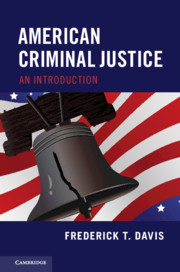Description
American Criminal Justice
An Introduction
Author: Davis Frederick T.
Provides a comprehensive, readable overview of how criminal justice actually works in the United States, and what makes US procedures distinctive and important.
Language: English
Subject for American Criminal Justice:
American Criminal Justice
Publication date: 07-2019
176 p. · 15.2x22.7 cm · Paperback
Publication date: 07-2019
176 p. · 15.2x22.7 cm · Paperback
Approximative price 65.00 €
In Print (Delivery period: 14 days).
Add to cart
American Criminal Justice
Publication date: 07-2019
176 p. · 15.7x23.5 cm · Hardback
Publication date: 07-2019
176 p. · 15.7x23.5 cm · Hardback
Description
/li>Contents
/li>Biography
/li>
American criminal justice may be one of the best known - and most influential - systems of criminal justice in the world, but also the least understood: countless films and television series portray American police officers, prosecutors and lawyers, but over 95 percent of criminal matters result in guilty pleas, and trials are becoming vanishingly scarce as people accused of crime choose to strike a deal with increasingly powerful prosecutors. Sentencing 'reform' has led to a burgeoning prison population that is by far the highest among economically advanced countries. Meanwhile, American prosecutors have gained increasing (and largely unchecked) power to apply US criminal laws to worldwide corporations and individuals with little or no connection with the country. American Criminal Justice: An Introduction provides a readable, comprehensive review of the American criminal process behind these and other problems.
1. Introduction; 2. The Federal structure: sources of the law; 3. Investigation and evidence gathering: the participants; 4. Investigation and evidence gathering procedures; 5. Arrest and pretrial detention; 6. The decision to prosecute, or not; 7. Joinder of charges and defendants; 8. Venue; 9. Assistance of counsel; 10. Trial rights and preparation for trial; 11. Alternative outcomes; 12. Double jeopardy; 13. The trial; 14. Sentencing; 15. Appeals; 16. Corporate criminal responsibility; 17. Internal corporate investigations; 18. Professional responsibility; 19. Conclusion.
Frederick T. Davis is a Lecturer in Law at Columbia Law School, New York, where he teaches courses on comparative criminal procedures and cross-border criminal investigations. He was a federal prosecutor in the United States Attorney's Office for the Southern District of New York, and served as law clerk to Henry J. Friendly, Chief Judge of the United States Court of Appeals for the Second Circuit, and Potter Stewart, Justice of the Supreme Court of the United States. He is a member of the bars of New York and Paris, is an elected fellow of the American College of Trial Lawyers and a life member of the American Law Institute, and was named a chevalier of the National Order of Merit of France. He lectures frequently at the Ecole Nationale de la Magistrature, Paris 2, and the Universiteit van Amsterdam, co-chairs the Business Crime Committee of the International Bar Association, and has served as a consultant to the prosecutors of the International Criminal Court and the International Criminal Tribunal for Rwanda.
© 2024 LAVOISIER S.A.S.




